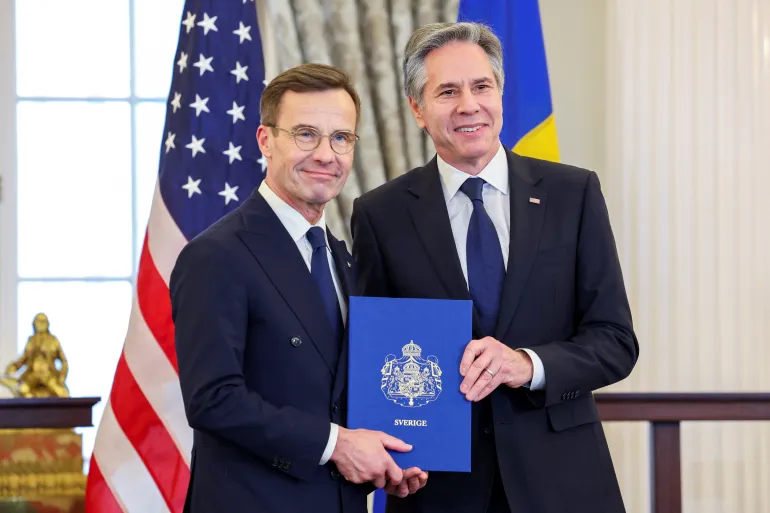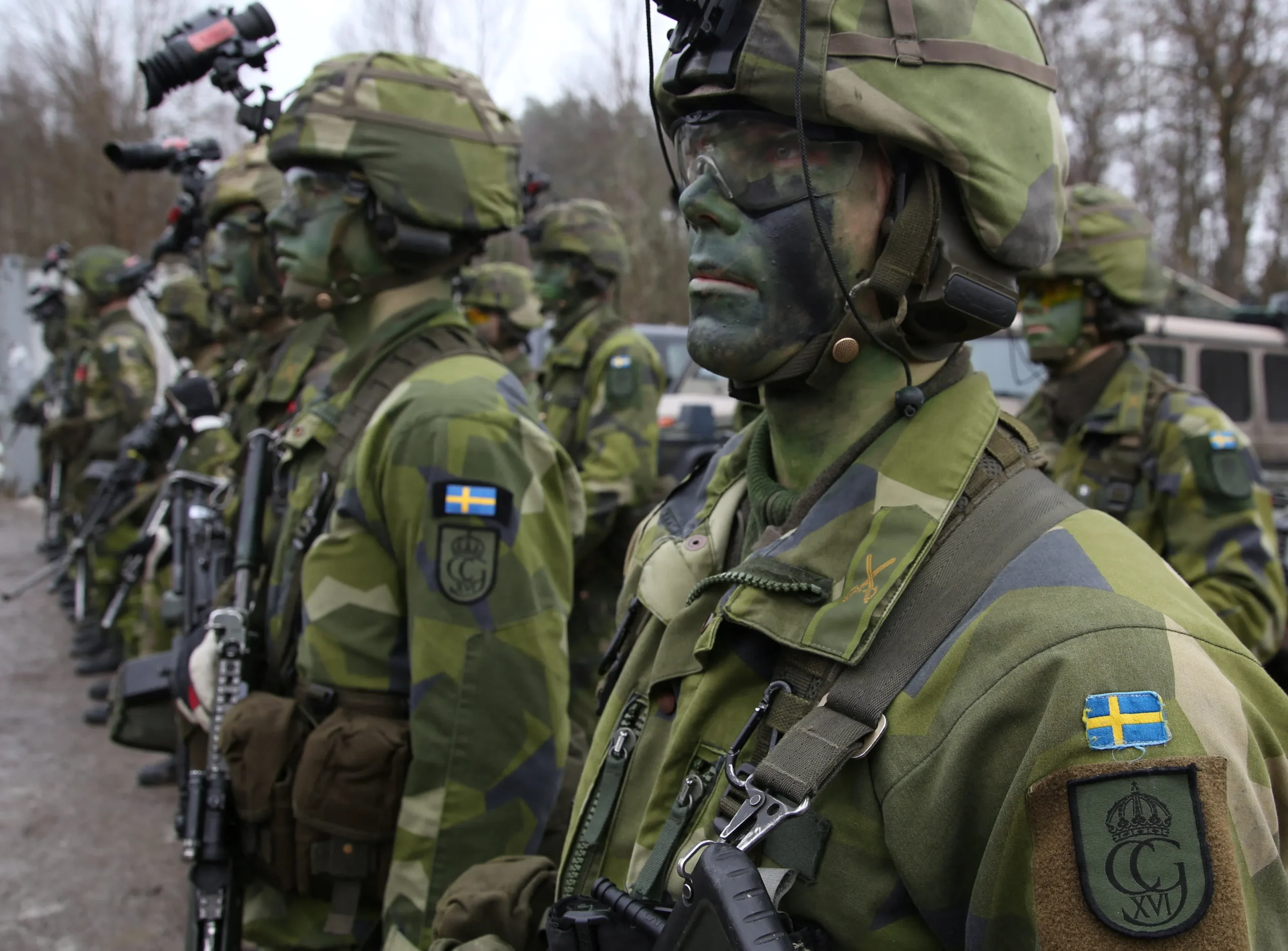Sweden Joins NATO, Ends Decades of Neutral Stance
In a historic move, Sweden has officially joined the North Atlantic Treaty Organization (NATO), marking the end of its decades-long policy of military neutrality. This decision comes amidst growing concerns over security challenges in the Baltic Sea region, particularly due to Russia’s assertive actions in recent years.
Background of Sweden’s Neutral Stance:
For more than 200 years, Sweden has maintained a policy of neutrality in armed conflicts, allowing it to stay out of both World Wars and other international conflicts. This stance has been a cornerstone of Swedish foreign policy, emphasizing non-alignment and independence in global affairs.
Shift in Security Dynamics:
However, the security landscape in Europe has undergone significant changes in recent times. Russia’s annexation of Crimea in 2014 and its military activities in the Baltic Sea region have raised alarms among neighboring countries, including Sweden. The deteriorating security situation has prompted Sweden to reassess its defense strategies and seek closer ties with Western allies.
Importance of Sweden’s NATO Membership:
Sweden’s decision to join NATO holds immense significance not only for the country but also for the broader European security architecture. It reflects a strategic shift towards a more proactive approach to addressing regional security challenges and strengthening collective defense capabilities.
Implications for Government Exams:
For students preparing for government exams, particularly those aspiring for positions in defense and civil services, understanding Sweden’s decision to join NATO is crucial. It underscores the evolving nature of international relations and the importance of adaptability in national security policies.

Why this News is Important
Strategic Shift in Swedish Foreign Policy:
Sweden’s decision to abandon its long-standing policy of military neutrality and join NATO marks a significant departure from its traditional stance. This strategic shift underscores the changing security dynamics in Europe and reflects Sweden’s commitment to enhancing its defense capabilities in response to evolving threats.
Enhanced Security Cooperation:
By joining NATO, Sweden aims to strengthen its security cooperation with Western allies and contribute to collective defense efforts. This move is particularly significant in the context of growing tensions in the Baltic Sea region, where Russia’s aggressive behavior has raised concerns among neighboring countries.
Impact on Regional Stability:
Sweden’s NATO membership is likely to have broader implications for regional stability in Northern Europe. It sends a clear signal to potential adversaries about the unity and determination of NATO members to defend against any threats to their sovereignty and territorial integrity.
Reassurance to Baltic States:
The decision is also expected to reassure the Baltic States and other NATO allies in the region, who have expressed concerns about Russian military activities near their borders. Sweden’s participation in NATO operations and exercises will enhance interoperability and coordination among allied forces, further bolstering deterrence capabilities.
Implications for European Security Architecture:
Sweden’s entry into NATO represents a significant development in the ongoing evolution of the European security architecture. It underscores the importance of collective defense and solidarity among European nations in the face of common security challenges, reaffirming the alliance’s relevance in the 21st century.
Historical Context
Background of Sweden’s Neutral Stance:
Sweden’s policy of military neutrality dates back to the early 19th century, with the country avoiding involvement in armed conflicts and maintaining a stance of non-alignment. This neutrality allowed Sweden to stay out of both World War I and World War II, preserving its sovereignty and independence.
Cold War Era:
During the Cold War, Sweden pursued a policy of non-alignment, balancing between the two superpowers, the United States and the Soviet Union. Despite not being a member of NATO, Sweden maintained close ties with Western countries while also engaging in limited cooperation with the Eastern bloc.
Post-Cold War Developments:
Following the end of the Cold War, Sweden continued its policy of military neutrality, focusing on maintaining stability in the Nordic region and promoting dialogue and cooperation among neighboring countries. However, the annexation of Crimea by Russia in 2014 and subsequent military activities in the Baltic Sea region prompted Sweden to reassess its security posture.
Rising Security Concerns:
In recent years, Sweden has witnessed increased Russian military assertiveness, including airspace violations and simulated attacks on Swedish territory. These developments have raised concerns about the security situation in the Baltic Sea region and prompted calls for closer cooperation with Western allies, including NATO.
Decision to Join NATO:
Sweden’s decision to join NATO reflects a strategic shift in response to evolving security challenges and underscores the country’s commitment to strengthening its defense capabilities and enhancing cooperation with like-minded partners in the face of common threats.
5 Key Takeaways from “Sweden Joins NATO, Ends Decades of Neutral Stance”
| Serial Number | Key Takeaway |
|---|---|
| 1. | Sweden has officially joined NATO, marking the end of its long-standing policy of military neutrality. |
| 2. | The decision comes amidst growing security concerns in the Baltic Sea region, particularly due to Russia’s assertive actions and increased military activities. |
| 3. | Sweden’s NATO membership holds significance for regional stability and enhances cooperation with Western allies to address common security challenges. |
| 4. | The move is expected to reassure Baltic States and other NATO allies in the region, strengthening deterrence capabilities and interoperability among allied forces. |
| 5. | Sweden’s entry into NATO represents a significant development in the European security architecture, reaffirming the alliance’s relevance in the 21st century context. |
Important FAQs for Students from this News
Q1: Why did Sweden decide to join NATO after maintaining a policy of military neutrality for decades?
A1: Sweden’s decision to join NATO is driven by the evolving security dynamics in the Baltic Sea region, with increasing concerns over Russia’s assertive actions and the need for closer cooperation with Western allies.
Q2: How does Sweden’s NATO membership impact regional stability in Northern Europe?
A2: Sweden’s entry into NATO is expected to enhance regional stability by strengthening collective defense efforts, reassuring neighboring Baltic States, and sending a clear signal about the unity of NATO members in addressing common security challenges.
Q3: What historical context led to Sweden’s policy of military neutrality?
A3: Sweden’s policy of military neutrality dates back to the 19th century, allowing the country to stay out of both World Wars and pursue a stance of non-alignment during the Cold War era.
Q4: How does Sweden’s NATO membership affect its defense capabilities and cooperation with Western allies?
A4: Joining NATO signifies Sweden’s commitment to enhancing defense capabilities and strengthening security cooperation with Western allies, fostering interoperability and coordination in addressing shared security concerns.
Q5: What are the key takeaways for students preparing for government exams from the article?
A5: The key takeaways include understanding Sweden’s shift from military neutrality to NATO membership, the implications for regional stability, reassurance to Baltic States, and the broader impact on the European security architecture.
Some Important Current Affairs Links

















